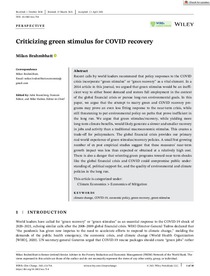Criticizing green stimulus for COVID recovery

2021
12
4
July - August
e714
epidemic disease ; sustainable development ; economic policy ; economic recovery
Economic development
https://doi.org/10.1002/wcc.714
English
"Recent calls by world leaders recommend that policy responses to the COVID crisis incorporate “green stimulus” or “green recovery” as a vital element. In a 2014 article in this journal, we argued that green stimulus would be an inefficient way to either boost demand and restore full employment in the context of the global financial crisis or pursue long-run environmental goals. In this paper, we argue that the attempt to marry green and COVID recovery programs may prove an even less fitting response to the near-term crisis, while still threatening to put environmental policy on paths that prove inefficient in the long run. We argue that green stimulus/recovery, while yielding more long-term climate benefits, would likely generate a slower and smaller recovery in jobs and activity than a traditional macroeconomic stimulus. This creates a trade-off for policymakers. The global financial crisis provides our primary real-world experience of green stimulus/recovery policies. A small but growing number of ex post empirical studies suggest that these measures' near-term growth impact was less than expected or obtained at a relatively high cost. There is also a danger that orienting green programs toward near-term shocks like the global financial crisis and COVID could compromise public understanding of, political support for, and the quality of environmental and climate policies in the long run."
Digital
The ETUI is co-funded by the European Union. Views and opinions expressed are however those of the author(s) only and do not necessarily reflect those of the European Union or the ETUI.